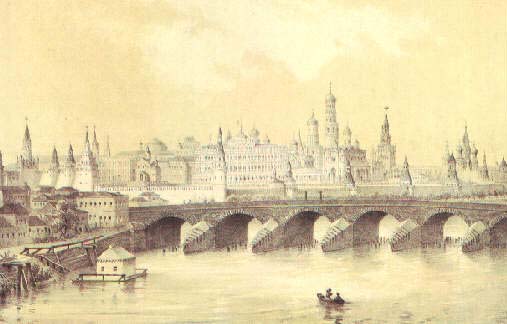| 
The Kremlin Towers
The erection of the Kremlin Walls and Towers of red-brick was begun
under Ivan III. On his decree the wooden constructions were destroyed
and the stone ones were built. Each Kremlin Towes has its own name and
history.

- The Borovitskie Gate-Tower, at the west end of the Kremlin walls, was
erected in 1490 during the rebuilding of the Kremlin. The tent-roofed
superstructure was added in the 1670s. It is the oldest entrance to the
Kremlin. Its name is derived from the word "bor" (forest) - suggesting
that the original settlement on the site of Moscow was established in
this wooded area (now represented only by some trees), on the Neglinnaya
River near the Moskva River.
- The ARMOURY Tower was built on the bank of the River Neglinnaya. It has
been called the Armoury Tower ever since the new Armoury was built next
to it in 1851. Before that it was known as the Stable Tower because of the old stables nearby.
- The COMMANDANT Tower got its present name in the 19-th century, when the town commandant moved to the Pleasance Palace close by.
- The TRINITY Tower is the Kremlin's highest tower and the last defensive
structure to be built on the Neglinnaya side. It got its present name in 1658 from the nearby hostelry of the Trinity Monastery of St. Sergius.
- KUTAFIA Tower. A stone bridge links Trinity Tower with Kutafia Tower
which served as a bridgehead.
In old times kutafia meant carelessly dressed, clumsy woman. Really Kutafia Tower is not high as the others, but squat and wide.
- MIDDLE ARSENAL Tower rises on the side of Alexandrovsky Garden. It got
its name from the Arsenal which is nearby.
- CORNER ARSENAL Tower is situated farther away, in the corner of the
Kremlin.
- St.NICHOLAS Tower stays at the beginning of Red Square. The tower is
named after the icon of St. Nicholas the Wonder Worker which used to be over the carriage-way gate of the bastion.
- SENATE Tower rises behind Lenin Mausoleum. The tower got its name from
the neighbouring Senate built at the end of the eighteenth century by the famous Russian architect Matvei Kazakov.
- SAVIOUR Tower. In 1658 the tower got its name after the icon of the
Mandilion which was over the gateway on the Red Square side.
- TSAR Tower. It owes its name to the legend that the tsars, Ivan the
Terrible in particular, liked standing up here to watch the bouts of fisticuffs below (there is no documentary proof of these legends).
- TOCSIN Tower got its name from the bell hanging in it which used to summon the townsfolk in times of danger.
- SS CONSTANTINE and HELEN Tower owes its name to the Church of SS Constantine and Helen which stood nearby.
- BEKLEMISHEV Tower's name is linked with a dramatic episode in the grand
princes' struggle to establish their power. Nearby was the house of the
ambitious and power-seeking boyar Ivan Beklemishev who in 1525 openly
challenged Grand Prince Basil III of Moscow and was executed by him. The
boyar's house and later the tower itself were turned into a prison.
- PETER Tower. The name is from the Church of Metropolitan Peter which
belonged to the hostelry of the nearby Ugresh Monastery.
- FIRST NAMELESS Tower.
- SECOND NAMELESS Tower.
- SECRET Tower. Originally the tower had a barbican with a secret passage
(hence its name) and a carriage gateway which led to the River Moskva.
- ANNUNCIATION Tower. It was named after the icon of the Annunciation
which was once above the gate.
- WATER Tower. It got its name from a water pump installed in the tower in
the seventeenth century.
|
 | |
| |


